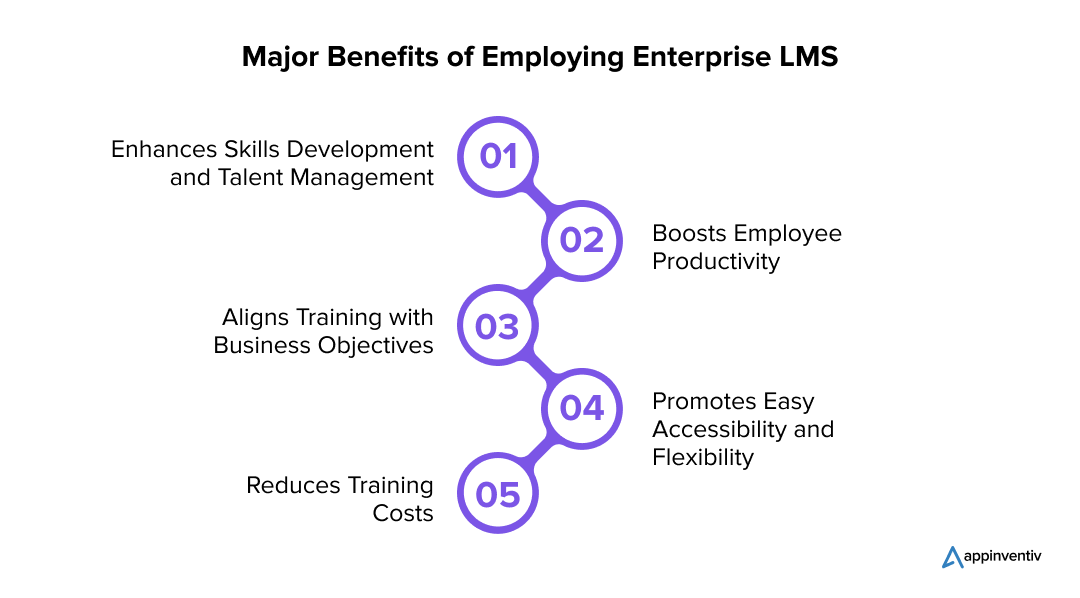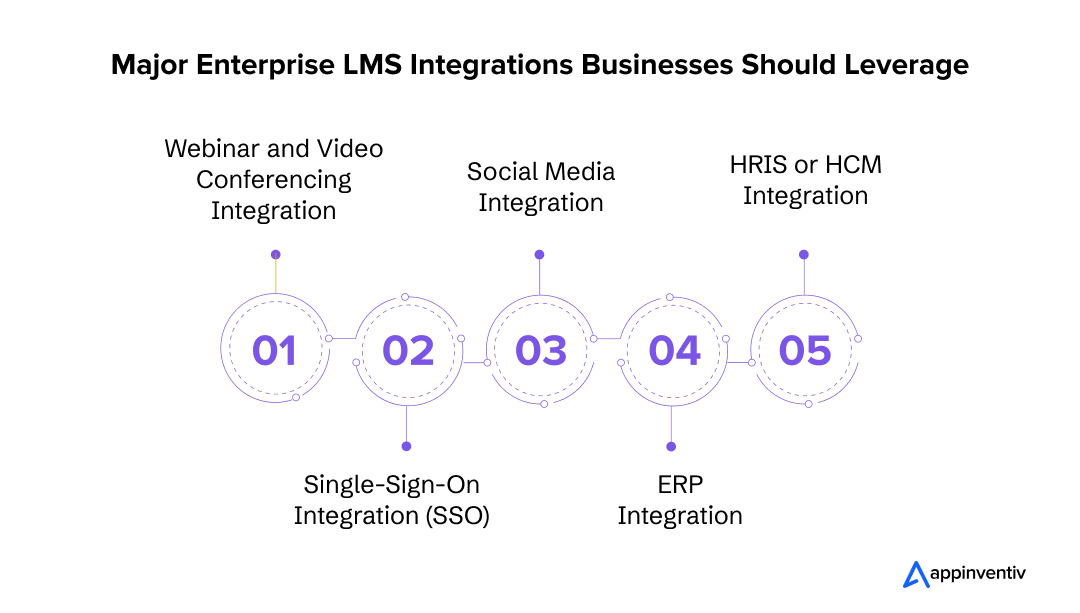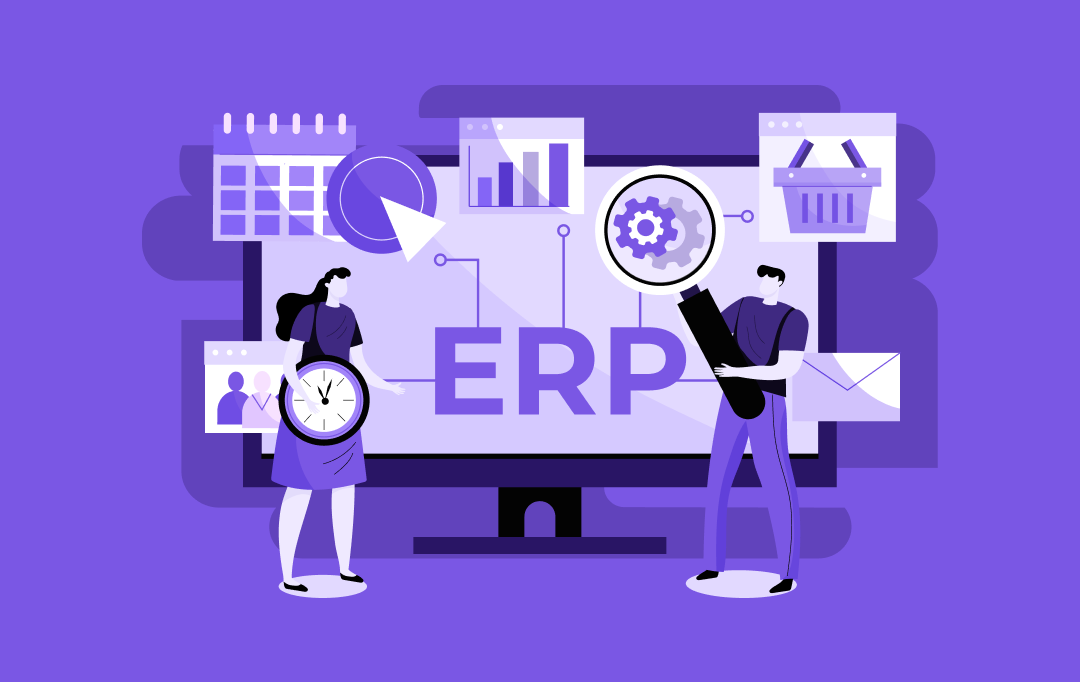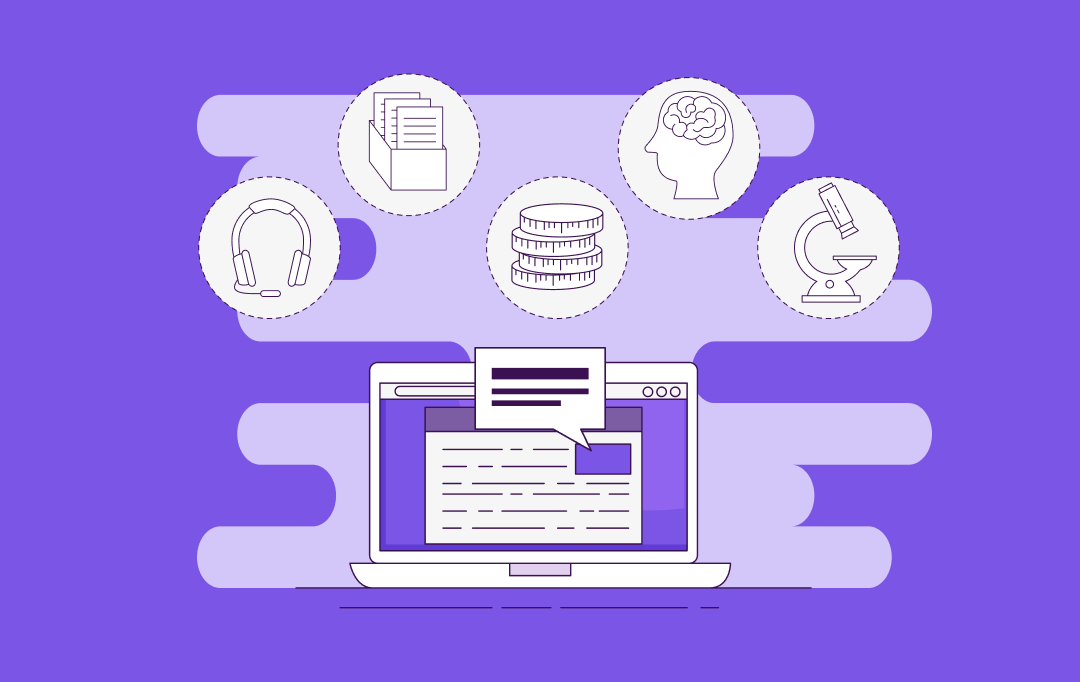- Understanding Enterprise Learning Management System: A Comprehensive Overview
- Decoding the Benefits of Enterprise LMS Development
- Enhances Skills Development and Talent Management
- Boosts Employee Productivity
- Aligns Training with Business Objectives
- Promotes Easy Accessibility and Flexibility
- Reduces Training Costs
- Core Features of a Custom Enterprise LMS
- Mobile Accessibility
- Customisation Scope
- High-End Integration Capabilities
- User Experience (UX)
- Scalability
- Content Management
- Security and Compliance
- Reporting and Advanced Analytics
- Enhancing Employee Learning with Key Enterprise LMS Integrations
- Webinar and Video Conferencing Integration
- Single-Sign-On Integration (SSO)
- Social Media Integration
- ERP Integration
- HRIS or HCM Integration
- Custom Enterprise LMS Development Process: A Step-by-Step Guide
- Step 1: Identify Key Requirements
- Step 2: Choose the Right Technology Stack
- Step 3: Design the UX and UI
- Step 4: Develop the Enterprise Learning Management System
- Step 5: Ensure Seamless Integrations
- Step 6: AI Features Incorporation
- Step 7: Quality Assurance and Testing
- Step 8: Deploy the System and Maintain
- Enterprise Learning Management System Development Cost: A Brief Overview
- Expanding LMS Capabilities with Appinventiv’s Custom Enterprise LMS Development Services
- FAQs
Empowering an organization’s workforce with updated knowledge and required skills is challenging. However, an Enterprise Learning Management System (LMS) can streamline workforce empowerment.
By harnessing effective Enterprise learning management system development, organizations today are able to impart corporate training to their employees, boosting overall organizational success. This is also the reason behind Enterprise LMS’s growing prominence.
With an estimated CAGR of 18.65% on its radar, as stated by MarketsandMarkets, the global Enterprise LMS industry is set to change the game for employee development. This growth is further fuelled by LMS’ unique blend of cutting-edge technologies and human-centric designs, which are making their way into the ever-growing arsenal of contemporary businesses.
Given the significant benefits and robust growth in the sector, integrating an Enterprise Learning Management System could substantially boost your organizational learning capabilities and operational efficiency, enabling more streamlined and effective employee development strategies.
From benefits of Enterprise LMS development to its various features and associated LMS development cost – this blog will help you get familiar with all of these and more!
Understanding Enterprise Learning Management System: A Comprehensive Overview
An Enterprise Learning Management System (LMS) is a sophisticated platform designed to streamline and integrate the learning processes within a corporate environment through structured training programs and immersive learning experiences.
The Enterprise Learning Management System not only assigns courses and study programs to employees but also tracks the candidates’ progress. As one of the pillars of corporate eLearning, LMS for Enterprises boosts employee learning initiatives significantly.
Along with offering professional knowledge and education, this also facilitates continuous professional development and skill enhancement, essential for keeping the workforce adaptive and competitive in rapidly changing industries.
By leveraging an Enterprise LMS, organizations can create customized learning paths tailored to the unique roles and career goals of their employees, thereby increasing engagement and retention. Furthermore, it enables companies to deploy scalable learning solutions that can evolve with technological advancements and business needs, ensuring that all team members remain at the forefront of industry standards and best practices.
Many enterprises leverage the benefits of LMS development for imparting knowledge on the business’s products and services to non-employees, including customers, sales representatives and even partners. This external training capability enhances overall brand engagement and extends educational outreach beyond the immediate organization.
Reflecting on this trend toward specialized training platforms, a Gartner report reveals that 47% of businesses search for LMS software to replace general-purpose tools such as emails, MS PowerPoint, and YouTube. This shift underscores the growing preference for specialized learning platforms over traditional communication and information sharing tools.
Thus, if you are a business looking to enhance your training and development processes, it’s high time to invest in an LMS for enterprise. This move can streamline your educational efforts, ensure compliance, and significantly improve organizational learning and productivity.
Decoding the Benefits of Enterprise LMS Development
Corporate business organizations aiming to enhance operational efficiency, employee skills and overall competitiveness in the workspace often implement an Enterprise LMS. This sophisticated tool is pivotal in centralizing and automating training processes, making learning resources more accessible across diverse geographic locations.
If you wish to understand the popularity of Enterprise Learning Management software development for businesses, let us help you uncover in detail the most leading benefits of Enterprise LMS development for your organisation.

Enhances Skills Development and Talent Management
Talent management targets developing future leaders in the workplace. Along with building talent pipelines, it also helps in locating skill gaps in employees. This is where an LMS for enterprise proves to be highly effective. How?
The LMS helps in identifying employee training requirements for employees and assesses employee competencies. Depending on the career goals of employees, the LMS creates custom or personalised training materials or learning courses.
By leveraging enterprise learning management software development, businesses can help employees with career advancement and employee development. As a result, companies will have a talented workforce, minimise attrition and attract the best talent in the industry.
Boosts Employee Productivity
With the help of an Enterprise LMS, employees learn new and updated skills, which they can implement in their jobs. This boosts employee performance significantly.
The LMS contains various interactive learning modules, a central collection of training information and various other tools with which employees can reskill and upskill themselves.
Constant learning and upskilling boost employee productivity, confidence and performance at the individual level, as well as for the business overall.
Aligns Training with Business Objectives
Every corporate setup has its own set of strategic priorities and goals to meet. In custom Enterprise LMS development, the LMS aligns the training programs as per the corporate goals and strategies.
With a proper LMS, corporates can create performance indicators, competencies and various learning paths as a part of the staff development program. This helps in fully enacting organisational goals, like product quality, customer satisfaction and boosted sales figures.
An extended Enterprise Learning Management System offers attractive features like immaculate reporting and advanced analytics. With facts and figures in hand, corporates can go for data-driven decision-making.
Promotes Easy Accessibility and Flexibility
One of the main benefits of Enterprise Learning Management System development is that it is flexible and accessible to employees. Employees will just need a device with an active internet connection to access the various course and training materials.
Because of the flexibility and easy accessibility, employees can train and learn at their convenience and from their preferred location and time zone. This flexibility not only increases engagement but boosts retention as well.
Reduces Training Costs
Expensive on-site training, in-person seminars and workshops are things of the past now for many corporates. These are resource, time and expense intensive. An LMS for Enterprise offers interactive and engaging online learning and training experiences to employees.
Corporates can train geographically distributed teams without compromising on the quality of the content. The systems come with automated reporting and tracking features to boost operational efficiency.
Core Features of a Custom Enterprise LMS
During Enterprise Learning Management System development, a host of features are implemented in the software. Let us take a look at some of the most prominent features of Enterprise LMS, which can promote great learning outcomes, organisational growth and user engagement.

Mobile Accessibility
Mobile accessibility is a mandatory feature in any LMS for Enterprise. Employees can access course and training materials at any place and at any time on the go. The Enterprise LMS you develop for your organisation must have an app for Android and iOS versions.
Customisation Scope
Different organizations have different learning objectives, training needs and branding guidelines. Therefore, the LMS must offer extensive customisation scopes to cater to varying requirements of customers and end users.
High-End Integration Capabilities
One of the most prominent features of Enterprise LMS is that it should have excellent integration capabilities for smooth workflow and optimal productivity. Along with the SSO feature (single sign-on), the LMS should be able to integrate with CRM, ERP, HR and other tools seamlessly.
User Experience (UX)
Without an easy-to-use interface, it will be difficult for the users to understand and process working with an Enterprise LMS. The platform should have an intuitive layout, promising smooth browsing and seamless navigation. Features like individual dashboards and easy access to training materials also enhance the overall user experience.
Scalability
It is normal for a business organisation to expand. Enterprise LMS solutions should be able to keep pace with the expansion and be able to accommodate the increasing user counts. Irrespective of the workforce volume, there should be no compromise in the user experience or performance.
Content Management
One of the Enterprise LMS development best practices and important features is having extensive content management functionalities. The system should have organisation facilities, uploading and distribution of different learning materials. There should also be a feature for generating and modifying courses on the platform.
Security and Compliance
All business organizations and corporate setups must protect private training data. The Enterprise LMS that you create must have data security features like secure hosting, encryption, regular security audits and role-based access controls. It is vital to check certifications and compliance with HIPAA, GDPR and SCORM.
Reporting and Advanced Analytics
One of the most vital features of Enterprise LMS is powerful reporting and advanced analytics tools. These tools help in measuring important metrics, like course completion rates, student growth, test scores and results. Real-time dashboards and customisable reports are also important features that an Enterprise LMS must have.
Enhancing Employee Learning with Key Enterprise LMS Integrations
Are you hoping to enhance your employees’ learning experiences with unique LMS features? Adding LMS integrations during Enterprise learning management system development can prove to be greatly useful. Let us check out some important Enterprise LMS integrations that you can leverage for your LMS:

Webinar and Video Conferencing Integration
Webinar and video conferencing integrations work well in an Enterprise LMS. Such software and tools prove to be helpful in group and individual learning. The learning process becomes more engaging and interactive with real-time communication and collaboration.
Some common LMS integrations for webinars and video conferencing are Adobe Connect, Zoom and GoToWebinar.
Also Read: How much does video conferencing app development costs?
Single-Sign-On Integration (SSO)
With SSO LMS integration, users need a single set of credentials to access certain platforms. With this integration, users don’t have to remember multiple credentials, reducing the risk of data breaches for corporate houses.
The best examples of SSO integrations include Google, Microsoft Azure AD, OneLogin and Okta
Social Media Integration
Integrating social media platforms with Enterprise LMSs helps in connecting with the greater community. This integration not only improves engagement but enhances the overall user experience significantly. With this integration, you can take polls, surveys and start meaningful conversations.
Prominent social media available for LMS integrations include Facebook, YouTube, LinkedIn, Twitter and Instagram.
ERP Integration
The ERP integrations with the Enterprise LMS help streamline the administrative and financial aspects of various educational services. These include learning delivery, staffing, scheduling and budgeting.
Examples of ERP integrations include SAP ERP, Oracle NetSuite, and Microsoft Dynamics.
HRIS or HCM Integration
The Human Resource Information System (HRIS) or Human Capital Management (HCM) takes care of HR and employee information within an organisation. Integration of the HCM or HRIS software with the Enterprise LMS helps in better management of employee onboarding, data and training.
Examples of HRIS and HCM integrations are Leapsome, Workday HCM and Connecteam.
Custom Enterprise LMS Development Process: A Step-by-Step Guide
Now that we know ‘what is an Enterprise Learning Management System?’ and its benefits, let us take a look at the LMS development lifecycle. The Enterprise LMS development process shares many steps with traditional software development lifecycles, but with specific considerations tailored to educational functionalities and corporate training needs. Let us look at the steps:

Step 1: Identify Key Requirements
Clearly understand what is the learning objective of your LMS for Enterprise. This platform is used for compliance training, skill development, employee onboarding, etc. However, developing a personalised one relevant to your organization would require a set of objectives unique to your organisation.
Identify end-users and key stakeholders and understand their requirements. In addition to this, also outline features of the platform depending on learning objectives and stakeholders’ inputs.
Step 2: Choose the Right Technology Stack
Make the right choice for frontend and backend technologies. Go for frameworks like Angular, React or Vue.js for intuitive, dynamic and responsive user interface.
You can pick Java, Python or Node.js as a robust backend technology for authentication, data processing and business logic in LMS for Enterprise.
For reliable database solutions, endow your trust in MongoDB, PostgreSQL or MySQL for course content, progress records and retrieving user data.
Step 3: Design the UX and UI
Design simple and user-friendly dashboards with smooth navigation for users. The design should be responsive and accessible across various devices.
Try integrating multimedia elements like interactive simulations, quizzes and engaging videos for an enhanced learning experience.
Step 4: Develop the Enterprise Learning Management System
To streamline your Enterprise LMS development process, use project management tools, like Trello or Jira, and version control systems like Git.
Implement robust authentication mechanisms for high-end user security. This might include authorisation protocols comprising two-factor authentication.
Develop core modules for course creation, tracking user progress and assessments. Enhance user engagement with gamification features.
Include various communication tools for seamless collaboration between users and instructors.
Step 5: Ensure Seamless Integrations
To maximize the utility of your Enterprise LMS, it’s crucial to ensure it integrates seamlessly with other essential software tools used within your organization. This includes HR systems for managing employee data, third-party content libraries for enriching the course material, and business intelligence tools for advanced reporting and analytics.
Consider using APIs and middleware solutions that can connect disparate systems without compromising data security or system performance.
Step 6: AI Features Incorporation
Use AI features and algorithms in the LMS development process for adaptive learning paths, analysing user behaviour, intelligent assessments, insightful and automated feedback, etc.
As the implementation of artificial intelligence is at its peak, your LMS system can also reap great benefits through it.
Step 7: Quality Assurance and Testing
A thorough functional testing ensures that all the implemented features in the LMS are working properly. In addition, scalability testing should also be considered so that the platform provides optimal performance in various conditions.
Another way to get valuable feedback is to try and engage end users in the testing process. In case any issues are identified, correct them at the earliest.
Step 8: Deploy the System and Maintain
Once all checks and tests are complete, Enterprise Learning Management Software development comes to an end. The software is now ready to be deployed for users.
Post-deployment, maintenance and regular updates are needed for the platform to function smoothly and seamlessly.
Enterprise Learning Management System Development Cost: A Brief Overview
‘How much does it cost to develop an Enterprise LMS?’ is one of the most common questions that agencies offering Enterprise LMS development services have to answer. The budget for Enterprise Learning Management System development depends on various factors – the tools that are used, the features that you want in the LMS, software complexity, integration scopes and many others.
There are also some other points that you have to consider when ascertaining LMS cost.
- What is the scope of work?
- Will the LMS be cloud or local?
- What will be the pressure on the system?
- Will it require regular maintenance?
- Are you looking to scale it up in the future?
Keeping these aspects in mind, LMS cost might begin at $25,000 for an MVP.
However, in general, Enterprise LMS development cost might reach $50,000 to $300,000, depending on the features, integrations, continuous support and assimilation of other immersive technologies.
Learning Management Systems costs also include technology licences and software, salaries of the Enterprise LMS development team, project management, etc. So, before you initiate the development process, make sure to prepare a practical budget that aligns with your objective and associated costs.
Expanding LMS Capabilities with Appinventiv’s Custom Enterprise LMS Development Services
While wrapping up our detailed discussion on Enterprise Learning Management system development, we hope that you now have a clear idea of this platform, its features and an estimate of associated costs.
Appinventiv is the reliable partner for developing a custom Enterprise LMS, thanks to our deep expertise and proven track record in the field. Our team of experts is skilled in crafting solutions that are not only functional but tailored to meet the unique challenges and objectives of your organization. We understand that each enterprise has its own set of requirements and learning outcomes, and our approach is designed to meet these needs precisely.
As a renowned enterprise software development company, our comprehensive LMS services are built with the future in mind, ensuring scalability and flexibility to grow with your business. We integrate the latest technologies and innovative methodologies to create systems that are robust, secure, and user-friendly.
From initial consultation to deployment and beyond, our dedicated team works closely with you to ensure that your LMS aligns perfectly with your business strategies and enhances your training capabilities.
Being a leading custom software development company, let us help you in building a learning platform that not only meets your current needs but also sets you up for future success.
Contact us and explore the possibilities of Enterprise Learning Management System Development for your business!
FAQs
Q: How to choose the best enterprise LMS?
A: Building the best enterprise LMS involves understanding your specific learning objectives, identifying key features that align with your organizational goals, and ensuring the system offers scalability and flexibility. Assess the customization options, integration capabilities, and user interface to ensure they meet the needs of both administrators and learners. Additionally, consider the service quality offered by the hired software development team to facilitate smooth implementation and ongoing maintenance.
Q: How much does it cost to develop an enterprise LMS?
A: The overall Enterprise Learning Management System Development cost can range from $25,000 for a basic version to $300,000 for a comprehensive system with advanced features and customizations. Factors influencing the cost include the choice of technology stack, the complexity of features, integration requirements, and the level of customization needed. Ongoing maintenance, licensing of technology, and potential scalability should also be factored into the overall budget.
Q: What are the future trends in Enterprise LMS development?
A: Some of the future trends in Enterprise LMS include gamification, augmented reality (AR) and virtual reality (VR), machine learning (ML) and artificial intelligence (AI). By assimilating these, LMS will further empower itself to provide even better learning solutions for corporate employees.



Custom Development or White Label Solutions: Which is Right for Your Business?
Key takeaways: 77% of companies are prioritizing digital transformation; the right tech approach is crucial for staying competitive. Custom development offers tailored solutions for unique needs, flexibility, and long-term scalability. Whereas, white-label solutions provide quick market entry, cost-efficiency, and easy customization for standard needs. Appinventiv’s expertise helps you navigate custom development vs white-label to choose…

ERP Integration in Australia - Why It Is Essential and How to Do It Right
Key takeaways: ERP integration enables operational efficiency, reduced costs, and enhanced decision-making. Healthcare, finance, manufacturing, retail, and all the other sectors are benefiting from ERP integrations in Australia. While ERP integration can be costly, ranging from AUD 45,000 - AUD 450,000, it leads to significant long-term savings and scalability. Compliance with Australian regulations is critical,…

Predictive Analytics Software Development - Features, Benefits, Use Cases, Process, and Cost
Key Takeaways Predictive analytics helps businesses shift from “what has happened” to "what will happen," enabling proactive strategies rather than reactive ones. Real-time analytics and AI integration are driving the growth of predictive analytics, making it more accurate, accessible, and critical for business success. Custom predictive analytics solutions can enhance customer satisfaction, reduce costs, and…



















